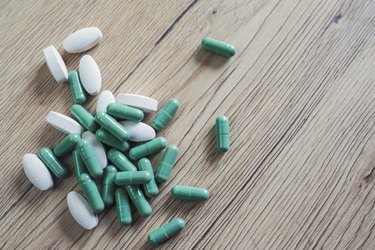
Probiotics are live, active bacteria that live naturally in your gut and help keep your whole body healthy. Some signs probiotics are working are normalized digestion and a healthy immune system. They're also available in supplemental form and in some of the foods you eat.
However, there may be risks and potential dangers associated with excessive or prolonged probiotic use. If you experience any adverse effects, you should stop taking probiotics. Of course, it's important that you speak with your doctor first to figure out if they're right for you and how to take them safely.
Video of the Day
Video of the Day
Find Your Dosage
If you decide to take probiotics, your dosages will vary between the type of supplement used and your personal health status. However, Harvard Health Publishing notes that a common dosage for adults ranges from 5 billion to 10 billion colony-forming units per day, and that you should take just one dose per day.
There is a possibility that you'll experience side effects of too much probiotics if you overdo it, and if you do, you should stop taking them. This is more common with probiotics in supplemental form than it is with fermented foods. Side effects may range from mild to severe and most commonly include loose stools (diarrhea), bloating or gas. Taking probiotics at the end of a meal instead of before one may help to reduce these symptoms.
When To Stop Taking Probiotics
Although side effects of probiotics are usually mild and resolve themselves pretty quickly, people with underlying or unknown health conditions may be at heightened risk of adverse effects. According to the National Center For Complementary and Alternative Medicine, probiotic use could lead to infection in those with serious medical issues or compromised immune systems.
Taking too many probiotics can also lead to over-stimulation of the immune system and the transfer of antibiotic-resistant genes. In other words, it's possible that taking probiotics could make you resistant to some antibiotics in the future.
If you don't feel well after taking probiotics, then you should stop taking them until you figure out what's going on. You should also stop taking probiotics if you have a weakened immune system or an underlying health condition and you haven't gotten the green light from your doctor that it's OK to include them in your daily diet.
Read more: 10 Prebiotic Foods to Add to Your Diet Today
Forms of Probiotics
Probiotics are available in pill, capsule and powder forms. However, it is also possible, and maybe a better idea, to get these bacteria through some the foods you eat. According to the University of Texas MD Anderson Cancer Center, one reason is because supplements like probiotics aren't regulated well, so the quality and ingredients can vary greatly between products. Another reason is that getting probiotics through food also provides other nutrients and reduces the risk of experiencing negative side effects.
The National Center For Complementary and Alternative Medicine also notes that some supplemental probiotics have been found to contain microorganisms other than those that are listed on the label, so you don't really know what you're getting with them.
Yogurt is a good source of probiotics and is commonly recommended for improving digestive health. Check labels to see if active or live bacterial cultures are listed, and avoid products that are high in sugar and fat. Other food sources of probiotics include sauerkraut, kombucha, kimchi, kefir and pickles.